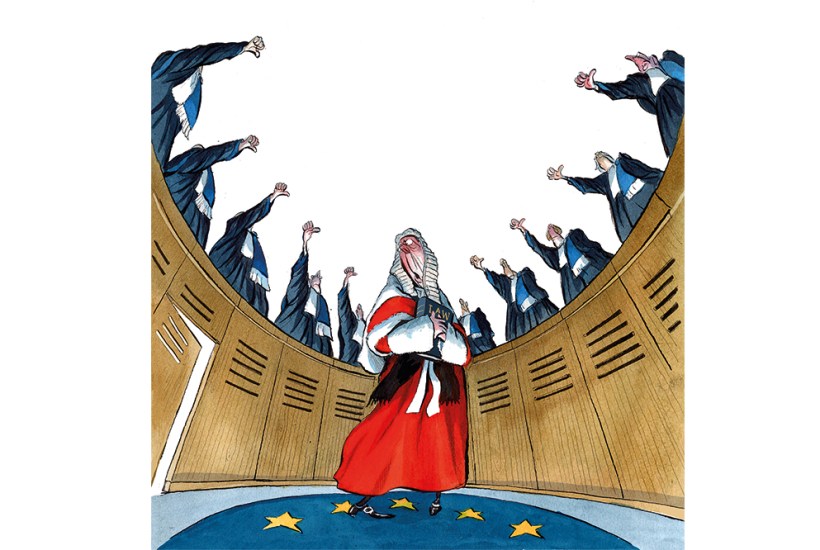The debate about the European Convention on Human Rights is in danger of being diverted into irrelevant byways. Hostility to the convention has become a trademark of the right wing of the Conservative party, which invites unnecessary partisanship. This is unfortunate, because the United Kingdom’s adherence to the convention raises a major constitutional issue which ought to concern people all across the political spectrum. It is far more important than Suella Braverman’s battles with boat people and ‘lefty lawyers’. Yet so far, the debate has rarely risen above the level of empty slogans, meaningless mantras and misleading claims.
One point should be made at the outset and never overlooked: we do not need the European Convention on Human Rights in order to protect human rights. Many of the rights which the convention proclaims were part of British law long before the convention was conceived. There is nothing in it that we cannot enact by ordinary domestic legislation. We can have whatever rights we want if there is a sufficient democratic mandate for them. The real purpose of the convention is to make us accept rights whichwe may not want and for which there maybe no democratic mandate.
No responsible critic of modern international human rights law proposes to do away with fundamental rights. The case is that the convention should be replaced with a domestic code of basic rights which would look very like it, with one important exception: it would not be subject to the jurisdiction of the European Court of Human Rights (ECHR) in Strasbourg.
That exception is important because the real problem is not the convention but the Strasbourg court. Under Article 32 of the convention, the ECHR is the sole judge of its own jurisdiction. It can and does help itself to whatever additional powers and jurisdictions it likes.
Let us take one or two examples. The first Article of the convention limits its scope to the territorial jurisdictions of state parties. This accords with the principle of territoriality, which is one of the building blocks of international law. Yet in 2011 the court suddenly reversed its own previous decisions on the point and claimed jurisdiction over British military operations overseas in places such as Iraq and Afghanistan. At one point it created havoc by ruling that there was no right to detain captured Taliban fighters as prisoners of war without complying with regulations designed for policemen turning in pickpockets at European police stations.
To take another controversial example, the convention provides that state parties are bound only by the final decision of the court in cases brought against them, but the ECHR has claimed the right to impose binding interim orders on state parties before the arguments have even been heard. It recently exercised this power to stop the first flights to Rwanda.
The European Convention on Human Rights is a treaty. The ordinary rule of international law governing the interpretation of treaties is set out in another convention agreed in 1969 under the auspices of the United Nations by almost every country in the world. It provides that treaties are to be interpreted ‘in good faith in accordance with the ordinary meaning to be given to the terms of the treaty in their context and in the light of its object and purpose’. But in 1978 the Strasbourg judges proclaimed what they called the ‘living instrument doctrine’. According to this, the court claims the right to develop the convention by recognising new rights thought to be in the spirit of the original treaty although never envisaged in it.
Thus, the notorious Article 8, which ostensibly protects private and family life against the intrusions of the surveillance state, has been interpreted by the ECHR as extending to anything that intrudes upon an individual’s personal autonomy. Since most laws do that, the result is to give the court the power to review the whole range of domestic law. Examples over the past half-century have included immigration and deportation, extradition, criminal sentencing, the recording of crime, abortion, artificial insemination, same-sex relationships, child abduction, the policing of public demonstrations, employment and social security rights, legal aid, planning and environmental law, noise abatement, eviction for non-payment of rent and much else besides.
In the process, the ECHR has devalued the whole concept of human rights. It has transformed the convention from a noble body of truly fundamental principles, almost universally shared, into something at once intrusive and banal. It has become a template against which to assess most aspects of the ordinary domestic legal order on principles which are highly contentious and far from fundamental.
Perhaps the most problematic area concerns qualified convention rights. These are rights which the convention says may be subject to exceptions where this is ‘necessary in a democratic society’ because of some sufficiently important countervailing public interest. Examples of countervailing public interests include national security, public order and the economic wellbeing of society. Most convention rights are qualified in this way, and most disputes are about the qualifications.
Who is to judge what countervailing public interests are sufficiently important or what is necessary in a democratic society? Balancing competing public interests is the essence of democratic government and participatory politics. How much privacy are we prepared to sacrifice in the interests of efficient policing? How much liberty are we prepared to sacrifice in the interests of preventing the spread of disease? How much freedom of speech are we prepared to sacrifice in the interests of ethnic harmony or the protection of personal reputation? These are intensely political questions. Not every society will answer them in the same way. But the ECHR has classified them as questions of law for judges. It has arrogated to itself the right to decide between competing public interests, and to determine what is necessary in a democratic society, irrespective of the views of democratic electorates.
None of these radical developments is foreshadowed in the language of the convention. None of them is even a natural implication from its terms. None of them has been agreed by the signatory states. They are all extensions of the convention which rest on the sole authority of the Strasbourg court. This is effectively a form of non-consensual legislation.
The ECHR issues more than 4,000 judgments a year, with a backlog last year of some 75,000 applications. Most of its decisions apply to all 46 countries of the Council of Europe, with very little regard to their different histories, moral and religious values, or legal and political traditions. The court is now much more than a judicial body. It is a great factory for making law, which has become a legislative and political authority for the whole of Europe. It is legislative because it claims and exercises the power to require state parties to modify their domestic law in accordance with its own views about what kind of laws a democracy ought to have. It is political because many of the issues which it decides are matters of political judgment on which states can legitimately differ.
Many people applaud the decisions of the Strasbourg court. Personally I think well of many of them. But the question is not whether we approve of Strasbourg’s laws, for we could make all of them domestically if we wanted to. The question is much more basic. How we should make law for our society? And does this particular way of making law have any democratic legitimacy?
Yes, say the Strasbourg judges. It is democratic because democracy is not just a procedure for collective decision-making. It is, they argue, a set of liberal values of which it is itself the custodian. Thus, whatever the court decides is by definition democratic even if the demos will have none of it. Yet to anyone who does not share this circular reasoning, it must be obvious that the court’s approach to the exercise of its powers is completely inconsistent with any kind of democratic decision-making. The UK and the other state parties are all democracies in name and almost all of them are democracies in fact. But none has any input whatsoever into the court’s decision-making process. The states agreed on the original text. But the ECHR has emancipated itself from the text and allowed itself to wander freely over the whole realm of social policy. The expanding range of matters which it treats as concerning human rights means that an ever larger number of contentious issues will be resolved by an international body standing outside the constitutional
order of the UK.
I once thought that the Strasbourg court could be reformed from within. There were signs of a more cautious and pragmatic approach with greater respect for the democratic processes of state parties. That would have been a less abrasive way of addressing the problems. But I no longer believe that this unwieldy body with its isolated splendour in Strasbourg, its arrogant self-assurance, its 46 judges from as many nations, its powerful registrar and its more than 200 ideologically committed staff lawyers is capable of changing direction.
If the UK was to withdraw from the European Convention on Human Rights, there would be voices raised to say that this was a retrograde step, a defiance of liberal values. It would be said that it puts us in the same corner as Russia – which habitually ignored Strasbourg rulings until it was expelled from the Council of Europe last year – or Belarus, which remains an applicant member but allows its citizens little in the way of rights.
All of this will be said, but it will be no more than rhetoric, and cheap rhetoric at that. Withdrawal from the convention will be an illiberal step only if we put nothing equivalent in its place, something which no one is suggesting. Russia and Belarus are not democracies and have no independent judiciaries. Britain has independent courts with a long tradition of defending fundamental rights and holding governments to account. There is no reason why they should not be trusted to enforce human rights without usurping the functions of democratic institutions in the way that the Strasbourg court has done.<//>
Got something to add? Join the discussion and comment below.
Get 10 issues for just $10
Subscribe to The Spectator Australia today for the next 10 magazine issues, plus full online access, for just $10.
You might disagree with half of it, but you’ll enjoy reading all of it. Try your first month for free, then just $2 a week for the remainder of your first year.














Comments
Don't miss out
Join the conversation with other Spectator Australia readers. Subscribe to leave a comment.
SUBSCRIBEAlready a subscriber? Log in